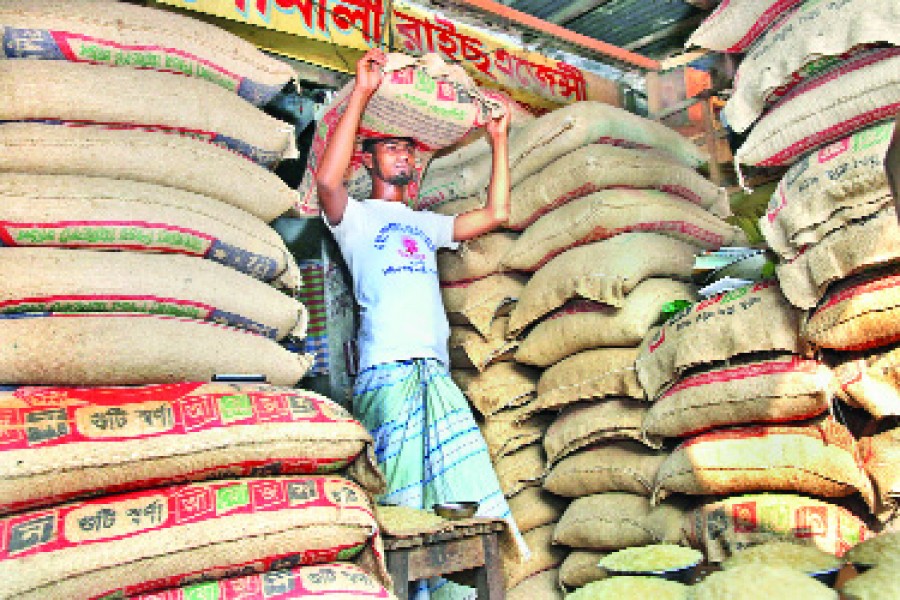
Published :
Updated :

Finer rice varieties are still trading at high prices in the city markets although paddy prices witnessed a fall in the milling hubs across the country over a month.
Market observers said traders are cashing in on the downtrend in paddy prices, while consumers are being ripped off.
Coarse rice prices, however, showed a marginal decline, thanks to the import duty cut by the government.
Finer quality miniket, najirshail and jeerashail were trading at Tk 54-Tk 62 a kg and medium quality lata and Brridhan-28 at Tk 50-Tk 52 a kg in Dhaka on Tuesday-almost the same price as it was in June, according to sources at the key kitchen markets in the city.
Although paddy prices have come down significantly at the district level, it is yet to be reflected in the city retail markets.
In the last one month, Boro paddy prices saw a plunge by Tk 150-Tk 300 a 75-kg sack.
Brridhan-28 variety paddy was selling at Tk 1500-Tk 1550 a 75-kg sack while jeerashail variety at Tk 1700-Tk 1750 in Rangpur, Dinajpur, Kushtia and Naogaon, according to trading sources.
Md Kamruzzaman, a rice trader at Badamtoli in the city, said prices of finer rice varieties declined only by Tk 30-Tk 35 a 50-kg sack at the rice mills in the last two weeks.
But this slight fall couldn't be reflected at the retail level, he added.
Mohammad Asadullah, joint secretary of Badamtoli-Babubazar Rice Wholesalers Association, said finer paddy prices decreased by Tk 4-Tk 5 a kg in the milling hubs. So, the prices of miniket, Brridhan-28 and jeerashail should come down by a minimum of Tk 4 a kg, he added.
Bangladesh Auto Major Husking Mill Owners Association (BAMHMOA) General Secretary KM Layek Ali said the import duty cut has led to the decline in paddy prices significantly, as stockists started selling out their paddy fearing a fall in prices.
He also said prices of finer and medium quality rice have decreased by Tk 2-Tk 3 a kg in rice mills in July. This downtrend would continue if paddy prices keep falling.
Miniket is selling at Tk 50-Tk 54 a kg while Brridhan-28 at Tk 45-Tk 46 a kg at mill gates, he added.
He also said the big traders in the cities should adjust the new prices.
Meanwhile, coarse rice varieties are now trading at Tk 43 to Tk 48 a kg at retail markets in the city, down from Tk 46-Tk 50 in June, according to sources at the key kitchen markets.
These varieties were selling at Tk 38-Tk 43 a kg in Rangpur, Dinajpur, Naogaon, Kushtia and elsewhere in the milling hubs, according to the BAMHMOA.
The National Board of Revenue reduced the import duty on rice to 10 per cent from 28 per cent on June 21, which helped ease coarse rice prices.
Meanwhile, the number of L/Cs for importing the staple through the private sector, showed a notable rise recently, according to food ministry data.
The private sector imported 0.117 million tonnes of rice in the first 23 days of this fiscal year while the total import in the last fiscal was 0.133 million tonnes, according to the ministry.
Sarwar Kajol, an importer in Naogaon, said the import duty cut has led to the increase in rice import.
Imported swarna variety was selling at Tk 39-Tk 40 a kg when the same variety from local sources was trading at Tk 42-Tk 44 a kg, he said.
The recent decision of the Bangladesh Bank (BB) allowing traders to import rice on three months' deferred payment (until December 31, 2017) has prompted importers to bring in more rice, he added.
Last month, the central bank allowed traders to import rice at zero margin. This means importers will not have to make any advance payment to banks for opening L/Cs.
According to the food ministry, prices of coarse varieties in Bangladesh are the highest among the rice-producing nations.
The prices of coarse varieties imported from India, Thailand and Vietnam are Tk 35.27 to Tk 38.09 a kg now when it is Tk 38-Tk 43 a kg (mill-gate price) in Bangladesh.
Farm economist Prof Gazi M Jalil said millers, traders and importers are making big profits due to the fall in paddy prices.
Big millers and importers should be brought under scrutiny so that consumers with limited income could buy rice at affordable prices, he said. The government should increase its market intervention to give low-income group some relief, he added.
Prof Jalil also said the public rice stock has declined to a record low, which is not a good sign for the food security of the country.
The government should have at least 0.7 million tonnes of rice stock, which is now below 0.2 million tones, he added.
He said the government should immediately bring rice from global sources, as another flood is likely to hit the country, which might cause further shortage of the staple.
The Directorate General of Food (DGoF), however, has floated tender for initially importing 0.6 million tonnes of rice from the international market.
The DGoF has, so far, purchased 0.129 million tonnes of rice from domestic sources against its target of 1.5 million tonnes, said officials.
The country set a target to produce 34.98 million tonnes of rice in the FY '17.
But the target might be missed as Boro production witnessed a significant fall due to flood and outbreak of rice blast disease, according to the Department of Agriculture Extension (DAE) and Bangladesh Bureau of Statistics (BBS) officials.
tonmoy.wardad@gmail.com


 For all latest news, follow The Financial Express Google News channel.
For all latest news, follow The Financial Express Google News channel.